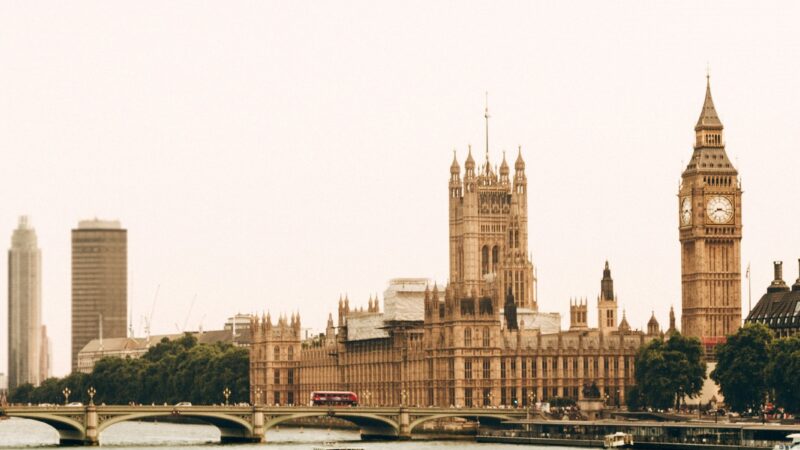Against assisted dying
It is unsurprising the government is rushing through ‘assisted dying’. Having decimated what little political capital it possessed after a hollow election victory, Labour is clearly desperate to shore up as many achievements as quickly as possible; successes which can be fashioned into something resembling a coherent and tangible legacy at a later date, showing little-to-no regard for the common good.
What is surprising is how limp-wristed and tepid the opposition to this policy has been, especially from Britain’s commentariat. In no uncertain terms, the assisted dying bill is one of the most radical proposals for social liberalisation in decades, yet our opinion-having class has alarmingly little to say, at least when compared to other matters. Those eager to broadcast their intelligence on other issues – which they’re similarly unqualified to write about (that’s not a bad thing, by the way; far from it!) – are inexplicably scared to take a crack at this offputtingly complex but highly important matter which affects us all.
What little discussion has occurred in the commentariat (never mind Parliament) has revolved around the foreseeable practical issues of such a policy, typically pointing to the results of Canada’s assisted dying policy (MAID; Medical Assistance in Dying), the initial proponents of which say is being abused. As such, opponents of assisted dying in Britain essentially oppose it on the basis of negative and unintended consequences, specifically the gradual loosening of safeguards overtime, killing people who should’ve received non-lethal forms of care.
None of this is wrong per se, although it’s hard to treat this angle as anything other than unsatisfying. It does not bode well for a civilisation that its only barricade against its destruction is the ineptitude of the barbarians.
More than a total lack of faith in anything improving at all, it suggests that we are caught between our reluctance to end life yet struggle to justify such an instinct; we retain the form of a society which professes something like the sanctity of life, but lack any of the substantial belief, frightened to unlearn that which can’t so easily be relearnt once lost to history as another primitive superstition.
It’s difficult to be truly hard-line on something like assisted dying because it elicits so much sympathy. No right-minded person wants people to suffer, never mind be made to feel that they are forcing people to suffer. After all, humans are motivated by aversion to pain more than most things. However, advocates of assisted dying use this fact to strongarm more hesitant individuals into agreeing with assisted dying in principle, disagreeing solely on the technicalities of implementation.
More often than not, support for assisted dying is couched in the idea that if you’re in ‘unbearable’ pain, you might as well be given the choice to end your life, especially if you’re going to die in six months anyway. Putting aside the remarkable precision of such a prediction, it never occurs to advocates that if you’re going to die in six months anyway, you might as well tough it out, if not for the sake of yourself or your loved ones, then for the sake of ensuring that society-at-large doesn’t suffer the wrath of short-sighted policy.
Of course, this is assuming unbearable pain is the main reason for assisted dying, contrary to plenty of evidence to suggest otherwise.
According to data from places where it’s already legal, the main reasons for assisted dying are the inability to fulfil day-to-day tasks and engage in ‘meaningful activities’. Even abstract notions like autonomy and dignity are cited as more important than pain. Even fear about being a burden on one’s family is reportedly just as common.
A real shame, that’s for sure. There are few greater exertions of autonomy than refusing to die for someone else’s benefit, and there is nothing more ‘undignified’ than having so little sense of self-worth that you sacrifice yourself for others in your most intimate and personal moment. If we can’t reserve ourselves for our own death, it’s no surprise that things like sex and marriage continue to lose any sense of exclusivity.
Concepts like ‘anarcho-tyranny‘ and ‘two-tier policing’ are typically used in discussions surrounding criminal justice, but the underlying logic surely applies to a system which releases unrepentant, serially violent criminals as it provides the sick and vulnerable – many of whom needlessly swell with guilt over their condition – with the option to end their own life. This sense of guilt will only become stronger when someone in a position of medical authority – in a culture which reveres expertise, even when it fails us – tells them they can make it go away. That which is legally a ‘right to die’ will feel like the duty to die, and by extension, those expected to sign-off on the procedure will feel as though they have a duty to kill.
Far from acting as a safeguard, medical professionals will act as affirmers to something which they’ve been told is not theirs to dictate in the first place. When the option is available, like the patient, the fact something can be done will weigh down upon them, and whilst they may be motivated by a desire to alleviate or prevent suffering, those once hesitant are now incentivised to act with urgency.
Indeed, the same can be said of the patient’s family, the consultation of which is notably absent from the bill’s supposedly stringent requirements, although they’ll certainly weigh on the patient’s conscience. If patients don’t feel burdensome to their loved ones, they’ll absolutely feel burdensome to the NHS, an institution our country continues to revere with mindless zealotry.
Courtesy of the selfish (but outwardly generous) nature of our present culture, the patient’s expectation of good care risks being outweighed by the ’empathy’ we demand them to have for others in a different position. Assisted dying is not yet legal and yet many already feel (perhaps not without reason) that the elderly are spitefully overstaying their welcome on this mortal coil.
Advocates of assisted dying (similar to advocates of abortion) like to believe that leaving something up to choice absolves the decisions made of any and all comparable virtue. Far from removing an ideological imposition on society, this notion that we have no choice but to leave everything up to choice, that all options must be on the table, is one of the most duplicitous and tyrannical value systems afflicting contemporary society; so much that life itself is ceasing to be the default, becoming just another option for which one is cruelly judged behind a veil of strained, artificial tolerance.
Extending the comparison, liberalising assisted dying doesn’t just implicate those who’ll be inevitably and unjustifiably killed in the name of healthcare, it devalues death outside of the circumstances in which assisted dying would be viewed as an option. When abortionists downplay (or functionally deny) the value of the child, they’re implicating any baby which (for whatever reason) doesn’t make it. A procedure once permitted for the sake of saving the mother’s life, balanced against the life of the child, is now a simple matter of preference, exalted as a form of empowerment.
Followed to its conclusion, an involuntary miscarriage, rightfully treated as a tragic incident deserving sympathy, can only be regarded, in all sincerity, as ‘tragic’ as receiving a bad hand in a game of Blackjack. Of course, insincerity is the essence of civility, and therefore integral to any tactful interaction, but this is not the same as having a genuine moral compass. The tragedy lies in the fact we know something deeply valuable has been lost. We say “I’m sorry for your loss” not “better luck next time” for a reason. As such, unless you intend to engage in mental gymnastics to suggest “terminating” highly viable babies past the legal limit is worlds apart to killing newborns, the recent movements for decriminalisation should be concerning, even if wholly in-step with our opponents’ revealed attitude towards the unborn.
In a similar vein, if assisted dying should be liberalised to alleviate suffering on the basis that our life is ours to use as we see fit, then suicide becomes just another expression of individual choice which needs to be destigmatised. After all, why should we need to suffer? Why would such a precondition exist if life didn’t have an inherent value, and if life has an inherent value, how could we justify a policy like assisted dying in the first place? Because the suffering outweighs that inherent value? How would you know when suffering outweighs this value? After all, suffering is extremely subjective. You can make this assessment for your own quality of life, but not for another person’s. Confronted with the potential suicide of another person, there’s not a lot you could do. You needn’t assist the act or condone it, but you’d be a hypocrite for showing or feeling anything more than defeated indifference. After all, who are you to judge? Again, it’s not your life. In order to override them, you’d need to believe life has a value beyond quantification, which it certainly does.
If one’s suffering is one’s business, then it becomes one’s business to deal with it, using their preferred option of the many made available. Although plausibly convenient, it makes life less rich, for what good are the virtues of mercy, assurance, and even heroism itself? More than rendered obsolete by consent-based ethics, they are contorted into acts of undue, arbitrary interference.
Life is worth suffering, not merely because of what can be done between our birth and death but due to its facticity; it is given, not chosen. Nobody derives meaning from the things they consciously choose; at least, not for long. There will always be the sense that relying on such things feels constructed, inviting us to seek something more essential. We don’t choose our nationality, our sexuality, our name, our family, and so forth, and so the importance of these things is heightened in an era with an abundance of choice.
The present political landscape serves as testament to this fact, not solely in the form of progressive-left identity politics. Regardless of how his economic prospects ebbed and flowed, the Englishman could rely on having won the lottery of life. He was born into a community with just cause and proficient capability to take his welfare seriously, as well as provide him with a sense of rootedness in an otherwise changing world. He had a cultural heritage which suggested he was part of something greater than himself; any belief in his abilities was well-founded and any shortcoming would surely be redeemed by the successes of his kin. Confronted with large scale demographic change from immigration, he feels himself in revolt against a class which has not yet taken everything from him, but is in the process of trying to destroy his few but cherished saving graces.
Even things which aren’t pleasurable, such as personal tragedies, supply us with a greater and much needed confrontation with the involuntary nature of our existence than even the most high-brow, profound, and enriching pastimes.
It is often said that the value of life lies in its depth, not its length; in other terms, life is about having a good time, not a long time, and whilst there’s certainly truth in this idea, it detracts from the distressing fact that we have time at all; a fact we tend to avoid truly thinking about until we’re out of it. Indeed, I suspect many have thought about how they’d spend their last day on Earth before resuming their lives as if their mortality was part of the hypothetical. The fact death takes us without our prior consent frightens us; it goes against what we regard as the basis for permissibility, so we’re inclined to ignore it.
The simple fact of the matter is that assisted dying is never abused; it merely comes to better embody the spirit in which it was introduced. The process misconstrued as the ‘slippery slope’ is nothing more than a superficially innocent argument being carried to its garish but logical conclusion. The ever-ambiguous safeguards aren’t meant to shield against improper uses of the system, merely to shield against uses which haven’t achieved mainstream acceptance, and could be used as a justification to prevent (or outright reverse) its full implementation. Things called insane right-wing conspiracy theories today will be referred to as inevitable and necessary progress tomorrow.
So, let’s cut to the chase. Instead of obsessing over regulations which will be altered or subverted, let’s be very frank about our fundamental and irreconcilable differences, and eagerly embrace the intellectually demanding and morally sensitive nature of this matter.
Those in support can make their case for life’s essential hollowness, and that our time on Earth is nothing more than taking the path of least resistance to the grave, filling our time with surrogate activities until it becomes too much, at which point we hop-off the existential ride. As for those opposed, we must more staunchly make the case for death as it comes for us, as it does. Just as we can gain value from being born here rather than there, from being this rather than that, the same must be said of our death. We do not view life as an empty vacuum to be filled with things that matter. The fact we do what we do, in the knowledge that our time is finite, makes what we do meaningful. Life gives meaning to our activities, not the other way around.
The advocates of assisted dying are right about one thing. We don’t get to choose what we do with our life, but it is because of this fact that our death remains our own. Therefore, the only way to ensure our death remains truly ours, something indivisibly belonging to us as individuals, free of aggregated social pressures and bouts of false consciousness, immune to last-minute bargaining and uncontaminated by ambiguity over cause-and-effect – altogether free from the risk of coercion – is to prevent it from being turned into a choice in the first place.










Can Britain do business with Taliban-led Afghanistan?
I can’t say I’ve ever hosted the Taliban, although if presented with the opportunity, the Worshipful Company of Brewers wouldn’t have been my initial choice of venue.
This irony wasn’t lost on Daniel Evans, frontier markets and technology investor, co-founder of the Gibraltar Stock Exchange Group, and Chairman of the newly-founded Afghanistan Advisory Council (AAC).
Evans joked the venue would allow him to lay claim to successfully organising a piss-up in a brewery, although it must be said the event wasn’t a piss-up at all – partially because the drinks were appropriately alcohol free, but mainly because the foundation of the AAC marks the first actual step at rapprochement with Afghanistan since the Taliban’s return to power in August 2021.
All-in-all, a pretty serious affair. Serious enough to receive a written endorsement from Nooruddin Azizi, Afghanistan’s Minister of Industry and Commerce:
The launch was attended by businessmen from a variety of interested parties; railway construction, petrochemicals, international finance, and so on. Michael Mainelli, current President of the London Chamber of Commerce and Industry and former Lord Mayor of the City of London was among those present, as well as Miles ‘Lord Miles’ Routledge, adventurer-turned-YouTuber-turned-junior member of the AAC.
Among other ambitions for a hospital, a hotel, a logistics centre, and a railway terminus, the AAC’s flagship proposal of a Special Economic Zone (SEZ), set to be attached to Kabul airport, has won the backing of Mohammad and Zahid Asif, Owner and Managing Director of Walid Titan Ltd respectively, who are providing the land for the zone.
The precise details of the SEZ have yet to be fleshed out, although it’s clear that the AAC is looking to Dubai’s International Finance Centre (IFC) as a model; a demarcated zone where the norms and customs of international commerce prevail, and regulations are to be drawn up on the advice of the AAC.
The SEZ is one of several projects set to be funded by a new National Growth Fund, which will provide resources to develop a diverse range of industries and projects, such as a far-reaching hospital construction programme. One of the hospital centres will be located in the SEZ. The AAC has been given the mandate to advise the creation of the fund.
One might ask why the Taliban would allow any of this. If one reads between the lines, the SEZ would allow what are essentially Western standards of conduct to take root in an otherwise Islamic theocratic state. Sure, it’s not exactly going to be Amsterdam but it’s hard to square such a proposal with the totalising ‘Islamofascist’ caliphate prophesised by thought leaders of the dilapidated pantheon of liberal-humanitarian interventionism.
The simple but surprising reality of the matter is the Afghans seriously want to get down to business. In fact, it’s becoming clear the Taliban are more eager to do business with the British than vice versa, and not without valid reason. They’re highly suspicious of the Americans, their opinion of the Russians isn’t much better, relations with Pakistan have massively deteriorated within the past year alone, and China and Iran look more like regional threats than potential allies.
As bizarre as it sounds, the Taliban’s view of the British continues to be informed by the Empire, which they regard in a similar manner to how many of us Moderns regard the Roman Empire; that is, as a milestone in human achievement. The British are viewed less as hated enemies and more as honourable and accomplished adversaries. If that’s not soft power, I don’t know what is!
As one would expect, the Afghans have zero appetite to be controlled by a foreign power, but they’re not completely isolationist; they’re quite happy to enlist the help of foreigners with the know-how required to stabilise their war-battered economy, having endured invasions from the USSR and the US-led coalition, ongoing skirmishes with groups like ISIS-K, and incoming Pashtun refugees from neighbouring Pakistan.
It’s a matter of political ideology whether it’s preferable to live in a less-developed but comparatively liberal country over a more-developed but comparatively illiberal one, but – as a general rule of thumb – it’s better to have functioning railways, roads, and hospitals than to not have them at all. Some things aren’t exactly ideological touchstones. Is it really so polarising to believe that Afghanistan should have a reliable supply of currency, rather than making do with sheets of borderline dust held together with glue and tape?
Beneath debates on the political and religious destiny of Afghanistan lies an economy which needs to be run regardless, and the AAC hasn’t so much muscled into this gap, but waltzed into it; partially because the organisation seems to be ahead of the curve on this issue, but also because its founding members felt they had nothing better to do.
On his release from jail in October 2023, having been arrested for not having his papers in order, Routledge – who described the experience as “the best networking opportunity I’ve ever had” – received an email from Evans with the subject line “Bored/gold mine lol” – a proposal which snowballed into setting up a full-on, nation-wide development fund with the blessing of the Afghan government.
Overall, the AAC is filling the vacuum left by a regime that doesn’t know what to do with Afghanistan. One suspects it’s pretty hard to see a path forward with that much egg on your face!
For the past two decades, Britain’s political system has stuck to the same playbook; a hodgepodge strategy of attempting to nag and bomb Afghanistan into becoming a liberal democracy with little-to-no regard for local idiosyncrasies and so forth.
Indeed, no country is a blank slate and Afghanistan is no exception, but more than an investment opportunity – that itself is laden with several obvious benefits; Afghanistan is rich with natural minerals – but a real chance to rehearse discombobulated statesmen and commentators in the virtues and practices which factor into good nation-building; which I cannot help but feel is the spiritual mission of the AAC, even if not said so outright.
Keir Starmer, take notes!
Photo Credit.